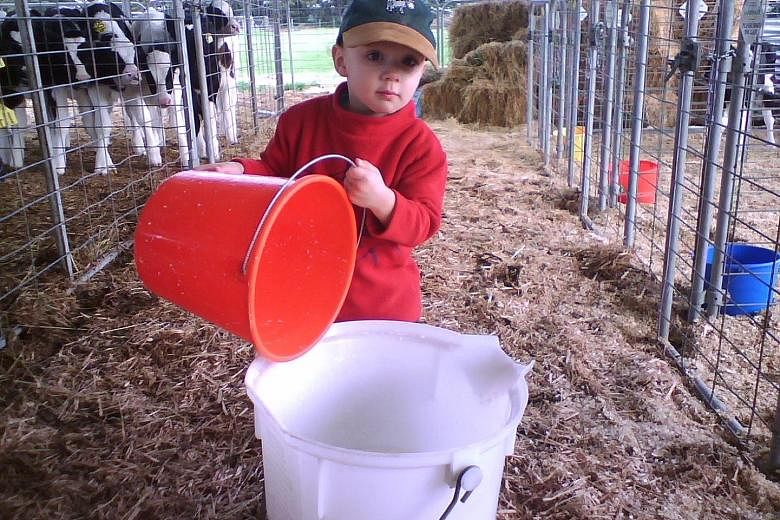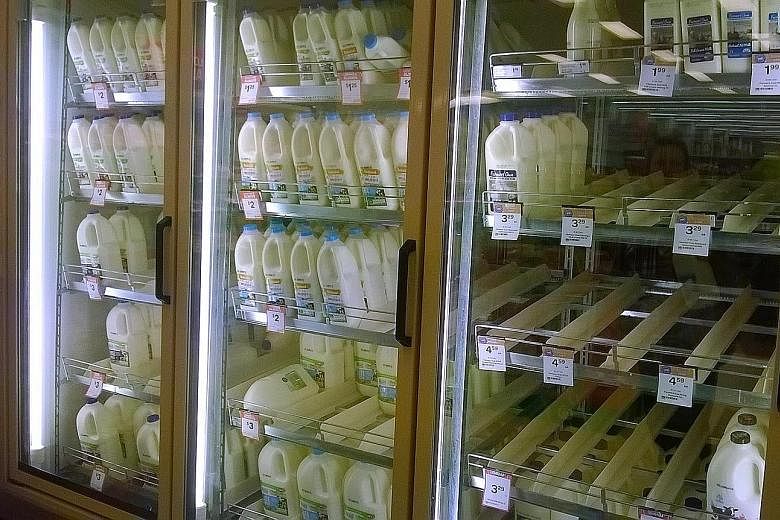In recent weeks, Australians have been posting photos on social media showing empty milk shelves at local supermarket.
The images are part of a campaign to assist the nation's 6,000 dairy farmers, who have urged Australians to eat more cheese, yogurt and ice cream as well as to avoid supermarket house brands.
The campaign follows a crisis facing the country's A$13 billion (S$13 billion) dairy industry because of a sharp drop in domestic milk prices.
Murray Goulburn and Fonterra, the country's two biggest milk processors, reduced their purchase prices from about A$5.60 per kilogram of milk solids to A$5 or less. For many farmers, this is lower than production costs. Worse, the price drop was retrospective, meaning farmers must pay back the amounts they were "overpaid" since last July.
Australia's corporate watchdog has announced an investigation into Fonterra and Murray Goulburn.
The falling price has been caused by easing Chinese demand, currency fluctuations and local supermarket price wars. In addition, global supplies increased after Europe removed limits on how much milk its farmers can produce.
Some farmers have been forced to sell dairy cows to abattoirs or convert their dairy farms to beef farms.
-
No fall in prices here
-
The prices of dairy products from Australia have not fallen in Singapore at supermarkets Cold Storage and Giant.
The chains told The Straits Times last Thursday that they have not had any downward price adjustments for these products.
Other supermarkets were not able to reply by press time.
Melissa Lin
Others, such as 26-year-old Will Ryan, a farmer in the state of Victoria, decided to sell the family farm. "It's difficult to get up and work 16 hours a day and know that you've lost A$1,000 or A$2,000 for that day," he told ABC News.
Following public protests and a vocal social media campaign, the federal government last Wednesday intervened, saying it would provide A$555 million worth of subsidised loans to farmers.
Agriculture Minister Barnaby Joyce warned the country's main supermarket chains to stop selling their A$1-a-litre house-brand milk, or they could face government intervention.
"Retailers need to understand that the A$1-litre milk that is cheaper than bottled water is not fair," he told The Australian last Thursday.
For many, the government action has come too late.
Australia exports 34 per cent of its milk and is one of the world's largest suppliers, but it could be forced to reduce its output. The biggest buyers are China, Japan, Singapore, Indonesia and Malaysia. Analysts have suggested volumes may have to be reduced by up to 5 per cent.
Across the country, the dairy farmers' plight has led to an outpouring of support. In cities and towns, people have collected donations or posted lists of which brands of dairy products use milk from local farmers.
Consumers have posted photos showing sold-out shelves of "branded" milk, alongside full shelves of the supermarkets' cheaper house- brand milk, which has been blamed for driving prices down.
"The cheap stuff has barely been touched. The word is getting out there, everyone," said a Sydney resident on Facebook, beside a photo of the local supermarket's fridge.
Farmers had a mixed response to the federal government's offer of the cheap loans.
Mr Alex Robertson, from farmers' lobby group Farmer Power, said: "Why the government is going to throw more loans at people who can't afford to pay the ones they have is beyond me."
Some have called for a 50-cents-per-litre milk levy to be paid by consumers. The funds raised would assist farmers.
But some analysts said a levy - and the social media campaign to buy more Australian dairy products - will have little effect.
Economics commentator Peter Martin likened the crisis to the end of Australia's mining boom, saying Australian company bosses had been too quick to assume that Chinese demand would remain "ever- increasing".
"We are limited in what we can do," he lamented in The Sun Herald on May 22. "Buying milk and cheese on the scale needed to help wouldn't be possible."


